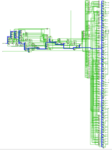bitu_tzp
Newbie level 4
hello i m student currently working on embedded system design. i have to deal with lots of analog signals, so i require to interface an adc with fpga. for that i ve tried with the onboard adc of spartan 3e. i tried and programmed it many times but the output which adc is showing does not match with the theoretical formula based value. any help regarding my problem will be appreciated. thanks
